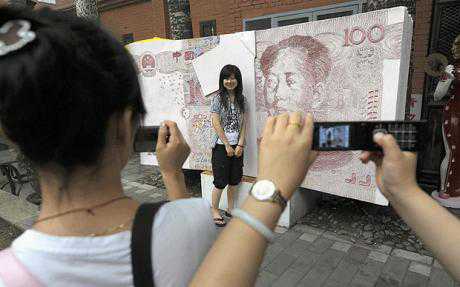You can date the end of dollar hegemony from China’s decision last month to sell its first batch of sovereign bonds in Chinese yuan to foreigners.
By Ambrose Evans-Pritchard
06 Oct 2009

Beijing does not need to raise money abroad since it has $2 trillion (£1.26 trillion) in reserves. The sole purpose is to prepare the way for the emergence of the yuan as a full-fledged global currency.
“It’s the tolling of the bell,” said Michael Power from Investec Asset Management. “We are only beginning to grasp the enormity and historical significance of what has happened.”
It is this shift in China and other parts of rising Asia and Latin America that threatens dollar domination, not the pricing of oil contracts. The markets were rattled yesterday by reports – since denied – that China, France, Japan, Russia, and Gulf states were plotting to replace the Greenback as the currency for commodity sales, but it makes little difference whether crude is sold in dollars, euros, or Venetian Ducats.
What matters is where OPEC oil producers and rising export powers choose to invest their surpluses. If they cease to rotate this wealth into US Treasuries, mortgage bonds, and other US assets, the dollar must weaken over time.
“Everybody in the world is massively overweight the US dollar,” said David Bloom, currency chief at HSBC. “As they invest a little here and little there in other currencies, or gold, it slowly erodes the dollar. It is like sterling after World War One. Everybody can see it’s happening.”
“In the US they have near zero rates, external deficits, and public debt sky-rocketing to 100pc of GDP, and on top of that they are printing money. It is the perfect storm for the dollar,” he said.
“The dollar rallied last year because we had a global liquidity crisis, but we think the rules have changed and that it will be very different this time [if there is another market sell-off]” he said.
The self-correcting mechanism in the global currency system has been jammed until now because China and other Asian powers have been holding down their currencies to promote exports. The Gulf oil states are mostly pegged to the dollar, for different reasons.
This strategy has become untenable. It is causing them to import a US monetary policy that is too loose for their economies and likely to fuel unstable bubbles as the global economy recovers.
Lorenzo Bini Smaghi, a board member of the European Central Bank, said China for one needs to bite bullet. “I think the best way is that China starts adopting its own monetary policy and detach itself from the Fed’s policy.”
Beijing has been schizophrenic, grumbling about the eroding value of its estimated $1.6 trillion of reserves held in dollar assets while at the same time perpetuating the structure that causes them to accumulate US assets in the first place – that is to say, by refusing to let the yuan rise at any more than a glacial pace.
For all its talk, China bought a further $25bn of US Treasuries in June and $25bn in July. The weak yuan has helped to keep China’s factories open – and to preserve social order – during the economic crisis, though exports were still down 23pc in August. But this policy is on borrowed time. Reformers in Beijing are already orchestrating a profound shift in China’s economy from export reliance (38pc of GDP) to domestic demand, and they know that keeping the dollar peg too long will ultimately cause them to lose export edge anyway – via the more damaging route of inflation.
For the time being, Europe is bearing the full brunt of Asia’s currency policy. The dollar peg has caused the yuan to slide against the euro, even as China’s trade surplus with the EU grows. It reached €169bn (£156bn) last year. This is starting to provoke protectionist rumblings in Europe, where unemployment is nearing double digits.
ECB governor Guy Quaden said patience is running thin. “The problem is not the exchange rate of the dollar against the euro, but rather the relationship between the dollar and certain Asian currencies, to mention one, the Chinese Yuan. I say no more.”
France’s finance minister Christine Lagarde said at the G7 meeting that the euro had been pushed too high. “We need a rebalancing so that one currency doesn’t take the flak for the others.”
Clearly this is more than a dollar problem. It is a mismatch between the old guard – US, Europe, Japan – and the new powers that require stronger currencies to reflect their dynamism and growing wealth. The longer this goes on, the more havoc it will cause to the global economy.
The new order may look like the 1920s, with four or five global currencies as regional anchors – the yuan, rupee, euro, real – and the dollar first among equals but not hegemon. The US will be better for it.
Telegraph








